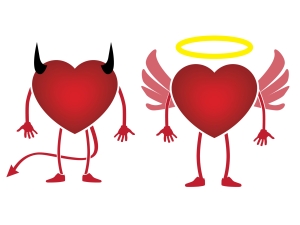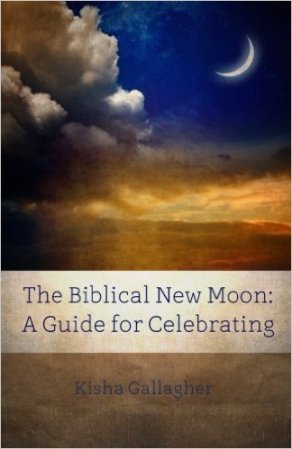In Part I, we looked at the Hebrew word arom (naked). I’d like to revisit this briefly as it is the context of this post. Adam and Chavah (Eve) were naked and not ashamed before they sinned. They were innocent without anything to hide. The enemy was also arum (cunning), and he was certainly hiding something. Now, let’s look at some of the words he chose to tempt Chavah.
The serpent said to the woman, “You surely will not die! “For God knows that in the day you eat from it your eyes will be opened, and you will be like God, knowing good and evil.” (Gen. 3:4-5)
Before we examine the verses above, let’s look at one more.
Then the LORD God said, “Behold, the man has become like one of Us, knowing good and evil; and now, he might stretch out his hand, and take also from the tree of life, and eat, and live forever”— (Gen. 3:22)
Did you notice the “cunning” of the serpent? He didn’t exactly lie to Chavah, did he? In fact, he used the truth. Perhaps the truth had a little twist or perhaps he caused her to doubt. Regardless, we all know the outcome. Their eyes were opened and they were like Elohim knowing good and evil. Sin stripped them (made them bare) of their heavenly garments (innocence), so Elohim covered them with ohr, mortal flesh or skin.[1]
One strategy of the enemy that is often overlooked is that he can use truth to strip one of their garments, thus covering one with shame. I wonder how many of us have followed his example unwittingly? Do we sometimes use truth to strip our neighbors? Do we sometimes leave people naked and in shame without covering them?
Dirty Laundry
 Sin is likened to dirty garments in the Bible.
Sin is likened to dirty garments in the Bible.
Now Joshua was clothed with filthy garments and standing before the angel. He spoke and said to those who were standing before him, saying, “Remove the filthy garments from him.” Again he said to him, “See, I have taken your iniquity away from you and will clothe you with festal robes.” Then I said, “Let them put a clean turban on his head.” So they put a clean turban on his head and clothed him with garments, while the angel of the LORD was standing by. (Zec. 3:3-5)
For all of us have become like one who is unclean, And all our righteous deeds are like a filthy garment; And all of us wither like a leaf, And our iniquities, like the wind, take us away. (Is. 64:6)
Conversely, clean garments can represent one’s righteous acts, salvation, wedding garment, or even the priesthood. Thus, we can figuratively “wear” anything from shame to salvation. This is a common biblical metaphor. But, it is also an English metaphor. Not long ago, I heard the old Don Henley song “Dirty Laundry.” It got me thinking about the sad state of social media, the news, and the like. People LOVE to put other people’s dirty laundry on display for the whole world to see. But even worse, those that claim to be followers of the Messiah are often the worst perpetrators.
After meditating on this, I printed out the lyrics to “Dirty Laundry”. You can see the full list here, but here is a sample:
Dirty little secrets
Dirty little lies
We got our dirty little fingers
In everybody’s pie
We love to cut you down to size
We love dirty laundry
We can do the Innuendo
We can dance and sing
When it’s said and done
We haven’t told you a thing
We all know that Crap is King
Give us dirty laundry
Why do we feel the need to air another person’s dirty laundry? Why do we always seem to focus on the crap? What would possess one to post the downfall of another human created in the image of Elohim on Facebook? How does this serve the King of the Universe? Are we without sin? No, yet we are often the first to throw stones at our brothers and sisters. Something in us secretly relishes in another person’s demise – and it’s NOT the Spirit of God! How sick and sad is this?
May I suggest that when we do things like this we are following the image of the serpent beast and not YHWH? The nachash (serpent) was the first to use this tactic. His careful choice of words made them doubt the motives and goodness of Elohim. His final blow was to tell them something that was true. They would indeed become like Elohim knowing good and evil.
You see, we think that just because we know something that it is always the will of the Father to reveal it. We fail to take into account the sovereign timing of YHWH. Only the Sower knows when the seed should be planted and when it will sprout to life. We are meant to be the servants and holy vessels Adonai uses to accomplish His will. We don’t decide these things, He does.
Now don’t misunderstand, I’m not suggesting that we withhold truth from people. Nor am I suggesting that we hide our light. But, what I am proposing is that we need to be careful in our method of delivery and in our follow-up (discipleship). Even with good intentions, we can strip the robe off of our neighbor and leave them uncovered and naked. For example, you might tell someone the truth about the origins of Christmas. This reality is painful. The person most likely has strong emotions, memories, and traditions tied to this unbiblical festival. If all you do is strip them of this dirty garment, you have left them naked.
“Lately My people have risen up as an enemy— You pull off the robe with the garment From those who trust you, as they pass by, Like men returned from war. (Mic. 2:8 NKJV)
This is the problem. Many love to proclaim the truth ONLY to shake the foundation or faith of others. But this isn’t LOVE unless one is also there to cover and protect their exposed and tender flesh. We must be merciful and allow others to grieve their loss (false covering). We also must be there to bandage their wounds with oil and wine and cover them with the true festivals and the comfort of the white linen garments of heaven. We are called to MAKE disciples and this requires a genuine relationship, not a Facebook meme or Youtube video.
What is Shame?
Recall that in the beginning, Adam and Chavah were naked (arom), but not ashamed. But once sin entered the equation, their nakedness became something else entirely. They were now naked (arum) like the serpent, with something to hide: sin. Sin shames us.
The Hebrew word for shame in Genesis 2:25 is boosh (beht, vav, shin). It carries the idea of great disappointment (in self). Pictographically, it means to be linked with the destroyer of the house/tent. Isn’t this exactly what happened to Adam and Chavah? Were they not found to be in collusion with the enemy of Adonai?
 Shame is the realization, sorrow, and guilt one feels when this truth is exposed. It is greatly humiliating whether the action was done in ignorance, through deception, or with our full intention. Our light or covering is ripped off to expose our weak and sensitive flesh. Shame can be quite devastating and is the cause of many suicides. Shame leaves a person in a state of feeling worthless and hopeless. And this is the goal of the enemy. He wants to kill, steal, and destroy any and all hope for a future.
Shame is the realization, sorrow, and guilt one feels when this truth is exposed. It is greatly humiliating whether the action was done in ignorance, through deception, or with our full intention. Our light or covering is ripped off to expose our weak and sensitive flesh. Shame can be quite devastating and is the cause of many suicides. Shame leaves a person in a state of feeling worthless and hopeless. And this is the goal of the enemy. He wants to kill, steal, and destroy any and all hope for a future.
How did YHWH respond to the “nakedness” in Adam and Chavah? We need to pay close attention to Adonai’s remedy, because it is THE pattern we are to use with one another when dealing with sin. Reread Genesis chapter 3. Notice that first, YHWH deals with their sin. He questions them about their participation while they are still exposed and trying to cover/hide themselves with fig leaves. Adonai hears both of their excuses, and then outlines the results of their actions. (He makes a righteous judgment.) The blame game didn’t absolve them from guilt or consequence.
But after making a righteous judgment, Adonai gracefully clothes the tender and exposed flesh of Adam and Chavah. He binds up their emotional wounds. He covers them with skins of flesh and takes them away from the temptation. This is mercy, grace, and love at its finest.
This is our model. If we are walking in the image of Elohim, we can remove the shame of our brothers and sisters the same way. Leaving them to wallow in their despair and hopelessness is the same thing as leaving them naked.
Clothing the Naked
‘For I was hungry, and you gave Me something to eat; I was thirsty, and you gave Me something to drink; I was a stranger, and you invited Me in; naked, and you clothed Me; I was sick, and you visited Me; I was in prison, and you came to Me.’ (Mt. 25:35-36)
Messiah says that when we feed, give drink, clothe the naked, visit the sick and prisoners, we are His hands and feet in the earth. How we treat our neighbors is of great import. Does He just mean this in the literal sense or is He also speaking figuratively? The metaphoric language of Scripture demands that His statement be both literal and figurative (spiritual). After all, humans are both flesh and spirit. Elohim always deals with the whole person.
This analogy is the same when we think we need to announce to the world another person’s sins, familial issues, finance issues, or the like. When we participate in tearing down the reputation and character of another human being created in the image of Elohim with great revelry, we are an enemy. We are satan. We are defaming the Name of our Great Elohim. We are a destroyer and accuser of the brethren. We are the man or woman that strips another down to naked shame. The only reason a person could take pleasure in such treachery is because they want to draw attention away from their own fig leaves of insecurity, rejection, and guilt. If one must tear down another person to feel better about their own issues, then they are no better than a beast. This is the attitude of a destroyer, a snake, and an accuser of the brethren.
As I write, we are in the Ten Days of Awe, the season of repentance. Yom Hakippurim is just around the corner. May we be reminded of the true reason for the fast:
“Is this not the fast which I choose, To loosen the bonds of wickedness, To undo the bands of the yoke, And to let the oppressed go free And break every yoke? “Is it not to divide your bread with the hungry And bring the homeless poor into the house; When you see the naked, to cover him; And not to hide yourself from your own flesh? “Then your light will break out like the dawn, And your recovery will speedily spring forth; And your righteousness will go before you; The glory of the LORD will be your rear guard. “Then you will call, and the LORD will answer; You will cry, and He will say, ‘Here I am.’ If you remove the yoke from your midst, The pointing of the finger and speaking wickedness, And if you give yourself to the hungry And satisfy the desire of the afflicted, Then your light will rise in darkness And your gloom will become like midday. (Is. 58:6-10)
 We should mourn and fast when a brother or sister falls or when they are living in the bondage of ignorance and false traditions. We should not be pointing our scaly fingers in accusation. Our fast is meant to break the bonds of wickedness and cause a well of repentance to spring in our neighbor’s heart. This is the will of YHWH. Sin oppresses one with a transparent garment of shame. But Adonai says, if someone is naked and exposed to the world on account of his or her shame, we should cover him or her with mercy and forgiveness. All the while, never forgetting (not hiding from the fact) that we too have flesh just as tender and needy. (This requires humility!) In other words, we are no better than they. This is how the original light that we bestowed in the beginning shines through the darkness of a fallen world.
We should mourn and fast when a brother or sister falls or when they are living in the bondage of ignorance and false traditions. We should not be pointing our scaly fingers in accusation. Our fast is meant to break the bonds of wickedness and cause a well of repentance to spring in our neighbor’s heart. This is the will of YHWH. Sin oppresses one with a transparent garment of shame. But Adonai says, if someone is naked and exposed to the world on account of his or her shame, we should cover him or her with mercy and forgiveness. All the while, never forgetting (not hiding from the fact) that we too have flesh just as tender and needy. (This requires humility!) In other words, we are no better than they. This is how the original light that we bestowed in the beginning shines through the darkness of a fallen world.
[1] For we know that if the earthly tent which is our house is torn down, we have a building from God, a house not made with hands, eternal in the heavens. For indeed in this house we groan, longing to be clothed with our dwelling from heaven, inasmuch as we, having put it on, will not be found naked. For indeed while we are in this tent, we groan, being burdened, because we do not want to be unclothed but to be clothed, so that what is mortal will be swallowed up by life. (2 Cor. 5:1-4)














